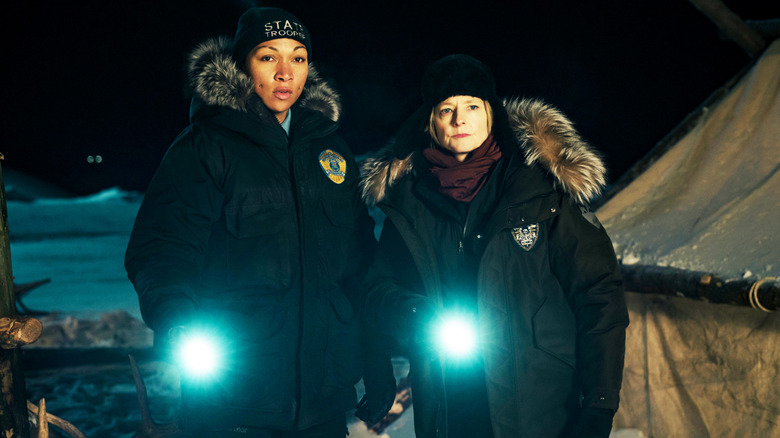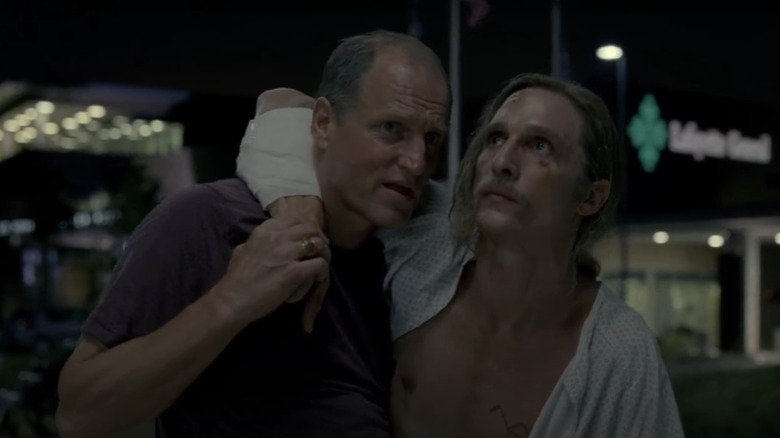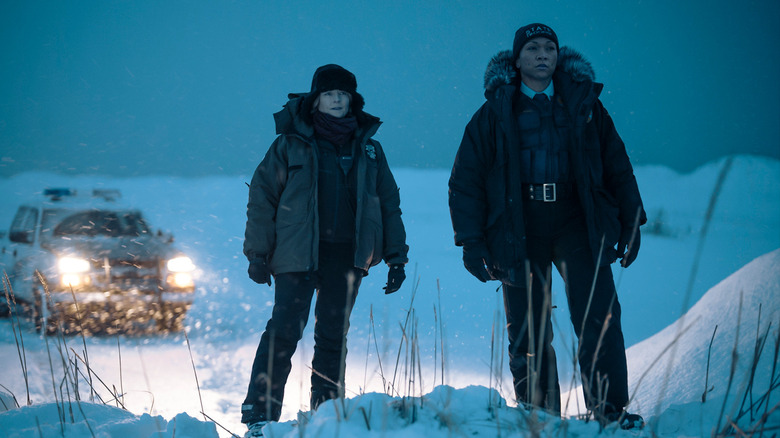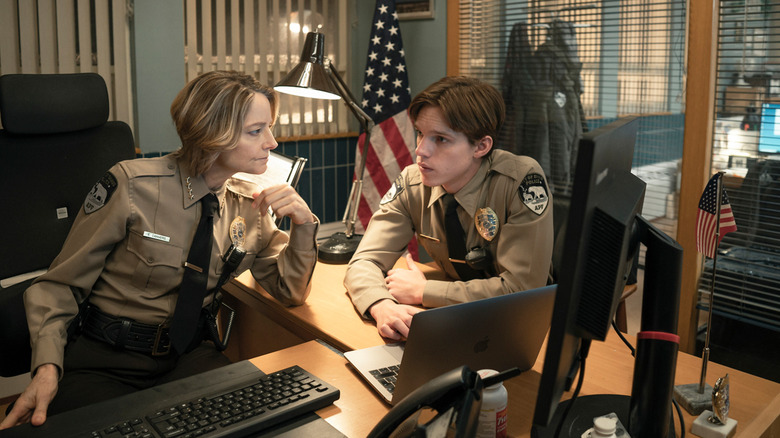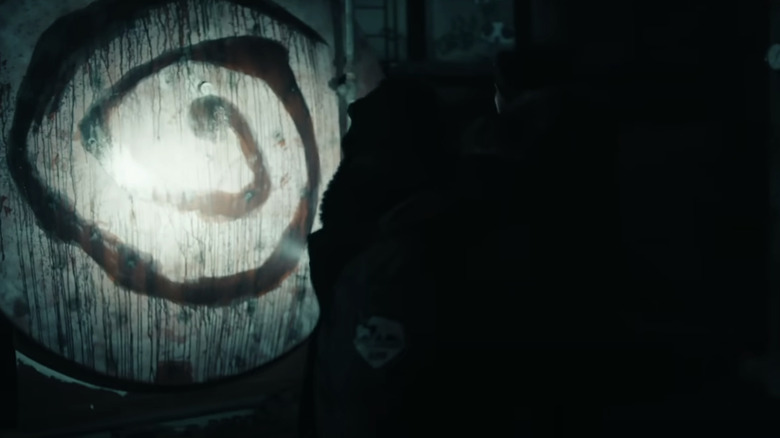True Detective: Night Country Puts Rust Cohle's Optimistic Final Line To The Ultimate Test
"True Detective: Night Country" has arrived and looks set to be the best season since the inimitable first. The fourth installment of the anthology series features an all-new story and is overseen by an all-new showrunner in the form of Issa Lopez, who directed the entire season and wrote every episode (sometimes working alone, othertimes with other writers) following the departure of show creator and "True Detective" mastermind Nic Pizzolatto.
But just because this is an entirely new story doesn't mean Lopez has fully abandoned the universe established by her predecessor. In fact, the show starts with a quote attributed to Hildred Castaigne, the central character in a short story from Robert Chambers' 1895 collection "The King in Yellow." That very book provided much of the mythos in which Pizzolatto drenched his Louisiana noir all the way back in 2014. Specifically, it contained the concept of a mystical fallen city named Carcosa and the figure of the Yellow King whom the season 1 cultists appeared to worship.
In that sense, "Night Country" looks to be picking up some threads left hanging in season 1. But more than simply porting over the cosmic horror influences that drove much of Pizzolatto's 2014 masterpiece, this new season seems to take direct influence from a now famous line uttered by Matthew McConaughey's detective Rustin Cohle in the season's final scene. In fact, "Night Country" almost feels like it's putting Cohle and his view of the universe to the test, and is all the more exhilarating for it.
Rust's 'light vs dark' theory
At the end of "True Detective" season one — which started life as a novel and a stage play — Rust Cohle sits in a wheelchair outside the hospital where he's being treated following his confrontation with serial killer Errol Childress. He's joined by Marty Hart (Woody Harrelson) and, in a reflective and touching scene, tells his detective partner that in the coma from which he's just awoken he felt the presence of his late daughter. He also reveals that while looking out from his hospital room at the night sky, he realized how the universe itself is "just one story, the oldest; Light versus dark," to which Marty replies with a pessimistic, "It appears to me that the dark has a lot more territory."
But as Marty helps his friend towards his car, Rust, the previously jaded and cynical detective, looks up at the star-filled night sky and in an uplifting moment of optimism delivers the line, "Once there was only dark. If you ask me, the light's winning."
Since "True Detective" season 1, we've had two further seasons that strayed away from cosmic horror influences and, though season 3 made reference to the inaugural season, seemed wholly removed from the universe originally established by Nic Pizzolatto. Now, though, we have "Night Country," which in its very first episode feels as if it's picked up right where Rust left off and is putting his grand "light vs dark" narrative to the ultimate test.
Welcome to Ennis, Alaska
"True Detective: Night Country" is set in Alaska, far removed from the humid environs of Louisiana where Marty Hart and Rustin Cohle carried out their decades-long investigation into the Yellow King cult. The fictional town of Ennis, Alaska, is home to Jodie Foster's police chief Liz Danvers (the series also has a direct line to Foster's classic "The Silence of the Lambs") who in episode 1 of the series is tasked with investigating the disappearance of an arctic research team.
This initial episode is full of horror imagery and a tone even bleaker and more suffocating than that of the first season's smog-filled troposphere and desolate towns that, in Rust's words, feel like "somebody's memory of a town, and the memory's fading." By contrast, when we're introduced to Ennis in episode one of "Night Country," the town has just had its final sunset of the year and is entering a long winter darkness whereby it will remain enveloped in blackness for weeks. Every scene that follows finds the characters and locations almost swallowed by the night, battling to exist in this sunless vacuum. Interior shots too, no matter how well-lit, are haunted by windows that reveal the ominous, ever-present black outside.
Adding to this oppressive and bleak tone is the sign for Ennis itself, which appears part-way through the episode and reads "Welcome to the end of the world" — a play on the fact that Ennis is pretty much as far north as you can get but which also sets a distinctly apocalyptic tone for the whole series. Indeed, the episode as a whole gives off a feeling that we very well could be witnessing the end of existence itself, which is where echoes of Rust Cohle's philosophy come in.
The dark is winning in Night Country
So, what does any of this have to do with season 1? Well, Rust's assertion that all of existence is just "one story; Light versus dark" appears to have appealed to Issa Lopez to the extent that, with "Night Country," she's depicting a kind of final showdown between the two. Not only did the director of 2017's excellent "Tigers Are Not Afraid" include the foreboding "Welcome to Ennis" sign, which seems to set the scene for some elemental battle, but the rest of the episode's production design and general aesthetics seem to be in service of this grand concept.
Rust and Marty's investigation in Erath, Louisiana saw them probing the darkness from the outside, traversing the sunlit landscape and gaining brief glimpses beyond the veil of everyday existence. "Night Country," on the other hand, feels as if it's set in the eye of the monumental storm that is this battle between light and darkness — and now, in opposition to Rust's optimistic final line, the light is losing.
Ennis' ever-present snow feels like fragments of existence itself suspended in the ether, as if reality has begun disintegrating under the weight of perpetual darkness. The scenes on the tundra, lit by single light sources, feel as if we're seeing things through the perception of a being whose sensual awareness is slowly fading. The whole thing feels like the culmination of a meta-narrative of existence, as if Lopez has plunged us into the heart of Rust's "one story."
Night Country and the origin of life
When Liz Danvers asks Finn Bennett's Peter Prior what the missing researchers were looking for before they vanished, Prior replies, "the origin of life." Later, Prior's son is revealed to be called Darwin — an allusion to the evolutionary biologist and author of "Origin of the Species." In that sense, Lopez is associating Prior and his family with life and creation, in stark contrast to Ennis' dark and apocalyptic aura. Prior is an officer on Danvers' team, and along with his boss and Kali Reis' Evangeline Navarro, represents one of the few well-intentioned and fundamentally good inhabitants of Ennis. Associating him with creation, i.e. light, puts him at odds with whatever malevolent force is at work in his town, be it supernatural or otherwise.
Once again, this adds to the feeling that we're witnessing a final fight between the fundamental forces of good and evil with "Night Country." Once you realize that throughout season 1 of "True Detective," Rust mentions that he grew up in Alaska and spent years there during a break in his Yellow King cult investigation, it stands to reason that whatever story Issa Lopez is telling in Ennis, it's interrogating the same grand concepts that Rust was talking about in his final scene. Who knows, maybe Liz Danvers will get closer to some answers during her spiral into the icy heart of darkness.
It's incredibly exciting to think that this is just the first episode. No doubt by the end of the six installments, we'll be fully ensnared in "Night Country" and its grand telling of the light vs dark story — especially since the trailer has already revealed the return of the spiral symbol from season 1. Maybe we'll even hear a little more about what happened to Rust.
